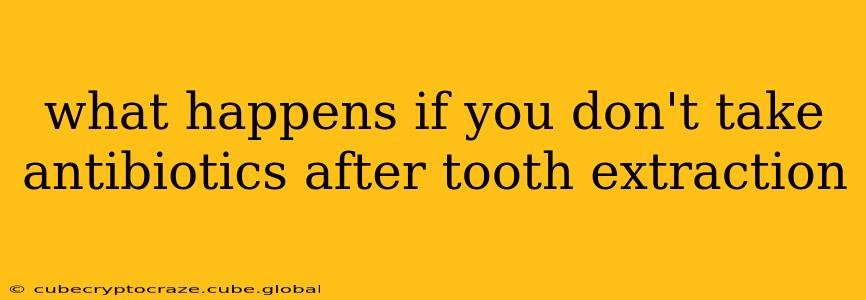What Happens If You Don't Take Antibiotics After Tooth Extraction?
Tooth extraction, while a common procedure, carries a risk of infection if proper post-operative care isn't followed. A common question many patients have is: what happens if you don't take antibiotics after a tooth extraction? The answer isn't straightforward, as it depends on several factors, but understanding the potential consequences is crucial.
It's important to note: This information is for general knowledge and should not be considered medical advice. Always follow your dentist's specific instructions and seek their guidance for any concerns regarding your post-extraction care.
Understanding the Role of Antibiotics in Tooth Extraction
Antibiotics are typically prescribed after tooth extraction only when there's a significantly increased risk of infection. This increased risk is often present in cases involving:
- Complex extractions: Extractions requiring significant bone or gum tissue removal.
- Infected teeth: Extractions performed on teeth already showing signs of infection.
- Compromised immune systems: Patients with weakened immune systems are more susceptible to infections.
- Presence of medical conditions: Certain medical conditions can increase the risk of post-extraction complications.
In most cases of straightforward extractions, the body's natural defenses are sufficient to prevent infection. Your dentist will carefully assess your individual situation to determine if antibiotics are necessary.
Potential Consequences of Not Taking Prescribed Antibiotics (If Prescribed)
If your dentist did prescribe antibiotics after your extraction, not taking them as directed can lead to several serious problems:
- Increased risk of infection: This is the most significant risk. Infection can manifest as pain, swelling, redness, and pus formation around the extraction site. It could potentially spread to adjacent areas, leading to more serious complications.
- Dry socket (alveolar osteitis): While not directly caused by not taking antibiotics, the absence of antibiotics might worsen the condition if it develops. Dry socket is painful and significantly delays healing.
- Prolonged healing time: Infections slow down the healing process, potentially leading to longer recovery times and discomfort.
- Need for further intervention: A significant infection might require additional procedures, such as drainage of an abscess, or further antibiotic treatment, potentially requiring more invasive procedures and additional costs.
What Happens If Antibiotics Aren't Prescribed and You Don't Take Them?
If your dentist didn't prescribe antibiotics, there is generally less risk. However, proper oral hygiene is still paramount. Neglecting aftercare can still result in:
- Minor infection: A less severe infection might develop, leading to mild discomfort, swelling, and delayed healing. This usually responds well to good oral hygiene and over-the-counter pain relief.
- Delayed healing: Poor oral hygiene can prolong the healing process, even without a noticeable infection.
What To Do if You Experience Problems After Tooth Extraction
Regardless of whether you took antibiotics or not, contact your dentist immediately if you experience:
- Severe pain
- Increased swelling
- Redness or pus formation
- High fever
- Difficulty swallowing
Prompt attention to any complications can prevent more serious problems.
How to Prevent Complications After Tooth Extraction (Regardless of Antibiotics)
Following your dentist's post-operative instructions carefully is crucial, whether or not you’re on antibiotics. This typically includes:
- Maintaining meticulous oral hygiene: Gently rinsing with saltwater and avoiding aggressive brushing or flossing near the extraction site.
- Following a soft food diet: This minimizes irritation to the healing area.
- Applying ice packs: To reduce swelling.
- Avoiding smoking and alcohol: These can interfere with healing.
In summary, while antibiotics can play a role in preventing infection after a tooth extraction, proper post-operative care is paramount in ensuring a smooth recovery. Always follow your dentist's instructions and contact them immediately if you experience any complications. Ignoring potential infection risks can lead to serious health issues and prolonged discomfort.
